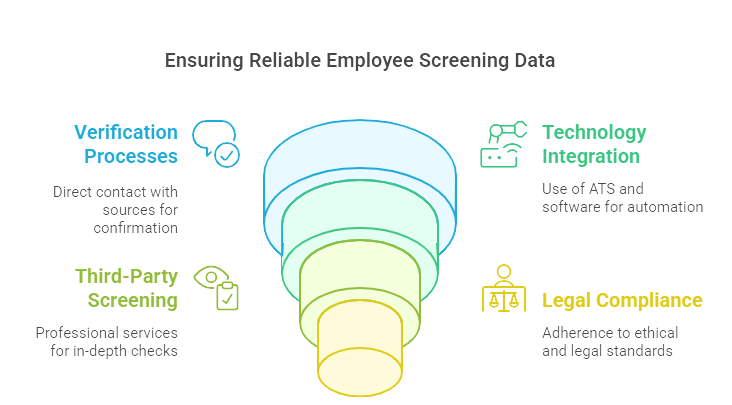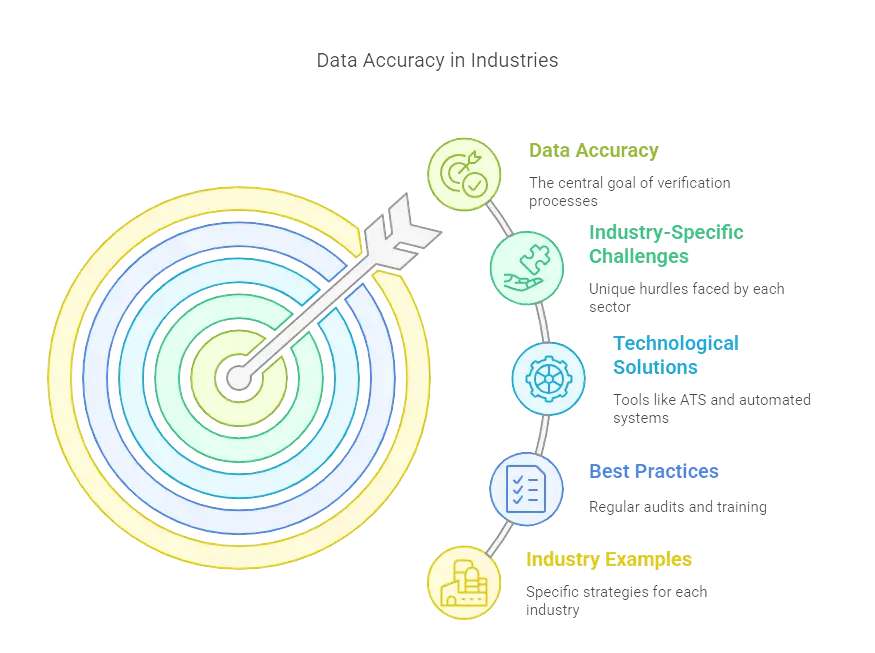Data accuracy in screening is critical for making informed hiring decisions. Inaccurate data can lead to hiring risks, legal repercussions, and lost productivity. This guide will walk you through the importance of reliable data, methods to ensure accurate information, and best practices for verification precision. Whether you're a business owner, HR professional, recruiter, or job seeker, understanding these elements is key to maintaining the integrity of the hiring process.
Key Takeaways
- Accurate employee screening data is essential in avoiding hiring mistakes, legal troubles, and reputational damage.
- A multi-layered verification approach, incorporating technology and third-party services, ensures high data accuracy.
- Adherence to legal and ethical guidelines in screening processes builds trust and maintains compliance.
- Regular updates and re-verification of employee data help maintain accuracy over time.
- Each industry faces unique challenges in maintaining data accuracy, necessitating tailored strategies and best practices.
Introduction
In today's competitive job market, accurate data in employee screening isn't just a nice-to-have—it's a must. Whether you're hiring for a high-stakes position in healthcare or bringing on seasonal staff in retail, ensuring the information about your candidates stacks up can make or break your operation.
Employee screening generally involves verifying a candidate's background to confirm they meet the qualifications for a job. This can include checking past employment, educational background, and criminal records. Here's why this is crucial: inaccurate data can result in hiring unqualified individuals, opening doors to legal difficulties, and tarnishing your brand's reputation.
So, what's the aim here? This article will give you the lowdown on how to nail data accuracy in your screening processes. We'll touch on the why behind accurate data, the how of verification techniques, and best practices to keep your hiring process tight. Whether you're a seasoned HR pro or a small business owner looking to make smart hires, you'll find valuable insights to boost your screening accuracy and, ultimately, your bottom line.

Importance of Data Accuracy in Employee Screening
Inaccurate data can throw a wrench into the entire hiring process. Imagine bringing on someone unqualified simply because their resume information wasn't properly vetted. Not only does this risk decreasing productivity, but it also opens up the company to potential legal issues and damages its reputation. Case in point: a tech firm once hired a "skilled" developer who fabricated their credentials. The result? Costly project delays and a tarnished brand image when the truth came out during a critical client meeting.
Conversely, accurate data streamlines the hiring workflow. It ensures that you're picking candidates with the right skills, which boosts team efficiency and saves costs linked to bad hires. Legal compliance is another huge plus. Following proper data verification protocols keeps you in line with labor laws and avoids costly penalties.
Statistics hammer home the point. According to a 2022 industry survey, about 53% of employers reported discovering false information on resumes. And it’s not just anecdotal; there are plenty of real-world examples. For instance, a healthcare facility avoided a catastrophic mistake by double-checking an applicant's educational credentials. They found discrepancies that prevented unqualified personnel from handling patient care, saving them from potential malpractice suits.
Ultimately, the integrity of your data sets the tone for the entire organization. Accurate, detailed checks aren't just a box to tick—they're your first line of defense against a bad hire.
EXPERT INSIGHT: Having an experience navigating hiring difficulties in various industries, I've become convinced that accuracy in data isn't a technicality—it's the building block of every good hiring choice. One errant discrepancy can ripple forward through an organization, to morale, performance, and trust. We owe our organizations—and our candidates that we work with—to treat screening information with care, with respect, and with meticulousness that it demands. When we lead with integrity and accuracy, we're building workplaces on foundations of equity, security, and long-term excellence. This isn't best practice in today's competitive talent environment—it's leadership in action. - Charm Paz, CHRP
Methods to Ensure Reliable Data
Ensuring reliable data in employee screening involves a layered approach combining traditional methods, technological tools, and professional services. Here's how you can achieve high accuracy in your background checks:
Verification Processes
Start with the basics: verify reference checks, education, and employment history meticulously. Contact previous employers directly and request detailed information about a candidate's role, duration of employment, and performance. For educational verification, reach out to institutions to confirm degrees and credentials. This thorough approach helps eliminate discrepancies right from the source.
Use of Technology
Leverage Applicant Tracking Systems (ATS) and background check software to streamline and automate the verification process. These technologies can cross-reference large datasets quickly, flag inconsistencies, and reduce human error. They also offer insights into patterns and trends that might indicate falsified information. Technology makes it easier to ensure every piece of data aligns with verified sources, saving time and increasing precision.
Third-Party Screening Services
Professional background screening companies specialize in digging deeper and providing comprehensive, accurate reports. They use a variety of tools and resources to verify criminal records, credit history, and other essential data points. Outsourcing to these experts can be a valuable investment, especially for roles requiring high-security clearance or extensive background checks.
Legal and Ethical Considerations
Adhering to legal and ethical guidelines is non-negotiable. Follow directives from the EEOC and the FTC to ensure your screening processes are fair and compliant. Make sure to get written consent from candidates before conducting background checks, inform them of their rights, and provide them access to their reports. Ensuring compliance not only protects your company but also builds trust with potential employees.

Best Practices for Accurate Information
Double-Checking Data
Ensuring data accuracy starts with not taking everything at face value. Always verify the information provided by candidates against multiple sources. Cross-referencing can nip inaccuracies in the bud, reducing the risk of hiring based on false details. For instance, confirming education credentials with the institution itself, rather than relying solely on documents provided by the candidate, can prevent falsified academic records from slipping through the cracks.
Regular Updates
Data verification isn't a one-and-done deal. The landscape changes – people acquire new skills, previous employers might cease to exist, and regulations are updated. Implement a policy for periodic re-verification to keep records current. For high-risk roles, consider re-checking credentials annually to ensure ongoing compliance and accuracy.
Employee Involvement
Transparency goes a long way. Engage candidates in the data verification process. Let them know what will be checked and why. This fosters trust and can prompt candidates to self-disclose any discrepancies beforehand, saving time and resources down the line. Including them in the loop can also reinforce your organization’s commitment to integrity.
Comprehensive Checks
A thorough background check goes beyond the basics. Criminal history, credit reports, and other relevant aspects like social media activity should be scrutinized, especially for roles with significant responsibility. Missed details can lead to major setbacks, so covering all bases is crucial. This means investing in reliable tools and services that can delve deeper into a candidate’s history, reducing the margin for error.
Adhering to these best practices will help ensure that the data you rely on remains solid and trustworthy, enhancing the overall integrity of your hiring process.
Verification Precision in Different Industries
Staffing Agencies
Staffing agencies face the unique challenge of quickly placing candidates in temporary positions while ensuring data accuracy. A common issue is handling the volume of candidates and the relatively short timeframe for placement. To address this, agencies should implement robust data management systems and automated verification techniques. Leveraging technology, such as Applicant Tracking Systems (ATS), can streamline the verification process. Agencies should also develop partnerships with reputable background check providers to ensure precision.
Healthcare
In the healthcare industry, the stakes are high; incorrect information can directly impact patient safety and compliance regulations. Verifying qualifications, licensing, and employment history is critical. Healthcare organizations should use specialized background check services that understand the sector's regulatory requirements. Regular audits and checks should be conducted to ensure ongoing compliance with standards set by bodies like The Joint Commission.
Transportation
The transportation sector operates under strict regulatory frameworks, making data accuracy non-negotiable. Key regulations from the Department of Transportation (DOT) require thorough checks on driving records, substance abuse testing, and employment history. Companies should implement continuous monitoring systems to ensure driver's credentials are always up-to-date. Automated systems can flag any discrepancies quickly.
Tenant Screening
Accurate tenant screening is essential to avoid potential problems like non-payment and property damage. Key data points include credit history, criminal background, and rental history. Property managers should use comprehensive tenant screening services that aggregate data from various reliable sources. Tools that offer real-time data updates can help maintain verification accuracy.
Non-Profit Organizations
Non-profits often rely on volunteers and face distinct challenges such as limited budgets for extensive background checks. However, ensuring data accuracy is crucial, especially when volunteers work with vulnerable populations. Non-profits should use cost-effective yet thorough verification methods, incorporating basic background checks and reference verifications. Clear communication with volunteers about the importance of data accuracy can also go a long way.
Retail
The retail industry experiences high turnover rates, which can complicate maintaining accurate data. To manage this, retailers should focus on streamlined and scalable verification processes. Conducting pre-employment screenings and periodic re-checks can help maintain data integrity. Retailers should also train hiring managers on the importance of data accuracy and how to verify it efficiently.
Technology
The fast-paced tech industry demands quick hiring processes, which can lead to corners being cut in data verification. To overcome this, tech companies should employ automated background check systems that integrate seamlessly with their existing recruitment tools. Regular updates to verification protocols can help keep pace with the dynamic nature of the industry.
Hospitality
In hospitality, employees often interact directly with customers, making data accuracy paramount. Verifying identity, employment history, and criminal background checks can ensure a safe and trustworthy environment for guests. Employing sector-specific background check services can help overcome common issues, and periodic retraining for staff on verification processes can maintain high standards.
In essence, while each industry faces unique challenges in maintaining data accuracy during employee screening, leveraging technology, regular audits, and industry-specific best practices can significantly enhance verification precision.

Conclusion
Summarizing the critical points, we’ve explored the profound significance of data accuracy in employee screening, from mitigating hiring risks to enhancing overall productivity and legal compliance. Key methods such as robust verification processes, leveraging technology, and engaging third-party screening services were discussed, all underscored by the necessity of adhering to legal and ethical standards.
The ongoing nature of maintaining data accuracy cannot be overstated. This diligence is crucial for building a competent and trustworthy workforce. Implementing the practices outlined in this guide will not only enhance your screening processes but also contribute to a more reliable and efficient hiring system.
Now, it’s time to take action. Integrate these best practices, stay vigilant, and continuously update your data verification processes to ensure the integrity of your hiring decisions. Data accuracy isn’t a one-time task; it’s a commitment to excellence.

GCheck Editorial Team
Meet the GCheck Editorial Team, your trusted source for insightful and up-to-date information in the world of employment background checks. Committed to delivering the latest trends, best practices, and industry insights, our team is dedicated to keeping you informed.
With a passion for ensuring accuracy, compliance, and efficiency in background screening, we are your go-to experts in the field. Stay tuned for our comprehensive articles, guides, and analysis, designed to empower businesses and individuals with the knowledge they need to make informed decisions.
At GCheck, we're here to guide you through the complexities of background checks, every step of the way.






